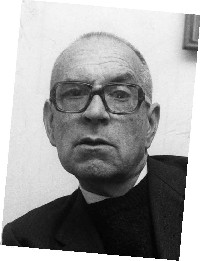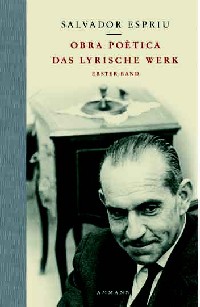

ESPRIU, Salvador (Santa Coloma de Farners, 1913 - Barcelona, 1985)

Escriptor. Cursà estudis de dret i d’història antiga. Les novel·les El doctor Rip (1931) i Laia (1932) trencaren amb les formulacions encara vigents del noucentisme. Després d’un creuer per la Mediterrània -bressol de les mitologies clàssiques que tant l’influïren-, va publicar Ariadna al laberint grotesc i Miratge a Citerea, que l’acreditaren com el narrador més original de la seva generació. Acabada la Guerra Civil, escriví Antígona (1939), sobre el tema de la guerra fraticida i la compassió per als vençuts. El 1946, amb el primer volum de poesia Cementiri de Sinera i l’obra de teatre Primera història d’Esther, començava la seva popularitat que aniria creixent a partir d’aleshores. Als anys cinquanta publicaria quatre excel·lents llibres poètics, entre els quals El caminant i el mur (1954) i Final del laberint (1955), i poc més tard les obres de teatre La pell de brau (1960) i Ronda de mort a Sinera (1966), que significaren la consagració popular del poeta. El 1968 començaren a publicar-se les seves Obres Completes, un corpus que ell mateix revisaria sovint a fi de convertir-lo en un tot ben travat. L’any 1971 obtenia el Premi Internacional Montaigne i el 1972 li era concedit el Premi d’Honor de les Lletres Catalanes.
Schriftsteller. Studium der Rechtswissenschaften und der Antiken Geschichte. Seine Romane Der Doktor Rip (1931) und Laia (1932) brachen mit den noch gültigen Stilmitteln der katalanischen Kunstströmung des Noucentismus. Nach einer Reise durch den Mittelmeerraum –der Wiege der klassischen Mythologie, die ihn stark beeinflusste- veröffentlichte er Ariadna im grotesken Labyrinth und Luftspiegelung in Citerea, die ihn als den originellsten Schriftsteller seiner Generation auswiesen. Nach dem spanischen Bürgerkrieg schrieb er Antigone (1939), das den Krieg unter Brüdern und das Mitleid mit den Besiegten zum Thema hat. 1946 kam ein erster Gedichtband unter dem Titel Der Friedhof von Sinera heraus sowie das Theaterstück Esthers erste Geschichte; von da ab wuchs seine Beliebtheit ständig. In den 1950er Jahren veröffentlichte er vier exzellente Gedichtbände, darunter Der Wanderer und die Mauer (1954) und Ende des Labyrinths (1955), sowie wenig später die Theaterstücke Die Stierhaut (1960) und Todeskarussel in Sinera (1966), die endgültig die Qualität seines Schaffens bestätigten. 1968 begann man seine Gesammelten Werke herauszugeben, deren Revision er zu einem guten Teil selbst vornahm, um ihnen ein geschlossenes Ganzes zu geben. 1971 erhielt er den Internationalen Montaigne-Preis und 1972 wurde ihm der Ehrenpreis der Katalanischen Akademie der Schönen Künste zuerkannt.
Writer. Salvador Espriu studied law and ancient history. His novels El doctor Rip (1931) and Laia (1932) broke from the formulas of noucentisme that were still in force. After a cruise through the Mediterranean - cradle of the classical mythology so influential to him -, he published Ariadna in the Grotesque Labyrinth and Mirage in Citerea, which established him as the most original storyteller of his generation. With the end of the Civil War he wrote Antigone (1939), which dealt with the themes of fratricide and compassion for the defeated. His first volume of poems, Cementery of Sinera (1946) and his work for the theater with First History of Esther marked the start of his popularity, which would increase from then on. In 1950 he published four excellent books of poems, among them The Wayfearer and the Wall (1954) and The End of the Labyrinth (1955), and, shortly after, the theatrical works The Bull-hide (1960) and Death around Sinera (1966), which solidified the poet’s popularity. In 1968 his Complete Works began to be published, a body of work that Espriu revised himself. Espriu won the International Montaigne Prize in 1971 and, in 1972, the Prize of Honor in Catalan Literature.
Selected works in translation
- Dutch Laia Menken Kasander & Wigman, 1995
- English
- The Bull-Hide The Marlboro Press, 1987
- Sinera Cemetery / Cementiri de Sinera North American Institute, 1988
- Selected Poems of Salvador Espriu W.W. Norton, 1989
- French
- Cimitière de Sinera / Les heures / Semaine Sainte José Corti, 1991
- La peau de taureau Ombres, 1990
- Les rochers et la mer, le bleu Ombres, 1990
- German
- Der Wanderer und die Mauer: Ende des Labyrinths / Die Stierhaut Piper, 1991
- Obra poètica. Das lyrische Werk Amman, 2007
- Italian Cristallo di parole Japadre, 1989
- Lithuanian Darzs ar pieciem kokiem Minerva, 2002
- Spanish Otra Fedra Ediciones Clásicas, 1995




